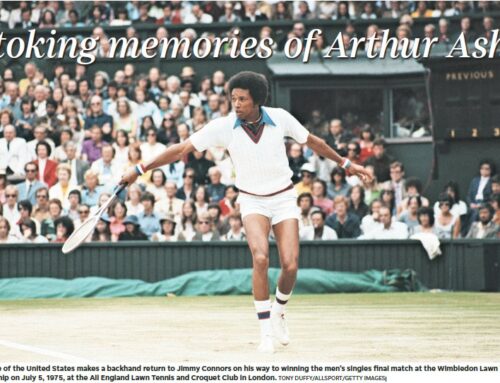The most important words that have
helped me in life – when things have gone
right or when things have gone wrong –
are ‘accept responsibility.’ — Billie Jean King
Billie Jean King will add another jewel to an enviable chain of lifelong accomplishments when the United States Tennis Association (USTA) makes her image on a poster the theme of the 2023 U.S. Open, which begins Monday. The artwork, designed by Brazilian illustrator Camila Pinheiro, commemorates the USTA’s decision, made in 1973 – to award equal prize money to women and men. “It’s stunning,” King said. “It’s just beautiful.”
King’s decision to stir the pot for equal prize money for women at the U.S. Open took root in 1972 when she received $10,000 after defeating Australia’s Kerry Melville in the 1972 women’s U.S. Open singles final and Romania’s Ilie Nastase took home $25,000 for beating Arthur Ashe in the men’s title match. At a news conference later, King expressed her displeasure. “So, I said to everyone, … this really stinks. I don’t think the girls will be back.” She believes that a USTA survey that year revealed that women pros drew more fans than the men helped their fight for change. A year later, the 1973 U.S. Open became the first sporting event to offer equal prize money to men and women pros.
The Australian Open first offered women pros equal prize money in the late 1980s but switched back to paying the men more in 1996, citing higher ratings for men’s matches. In 2001, The Australian Open once again became the second major tennis event that had an equal pay policy. The 2006 edition of the French Open saw women claim the same amount as men, leaving Wimbledon as the last major to award women players equal pay. On the eve of capturing her third grass-court major title, Williams talked to Wimbledon representatives and addressed the International Tennis Federation’s (ITF) Grand Slam Board. A year later, Williams wrote a commentary published by the Times of London, in which she wrote, “I intend to keep doing everything I can until Billie Jean’s original dream of equality is made real.”
When Williams claimed her fourth Wimbledon singles title in 2007, she became the first female to receive a Wimbledon winner’s check that equaled her male counterpart, thus ending the gender pay gap at all four major tennis events. “Create your legacy and pass the baton,” King once said.
A Long Beach, CA. native, King gravitated to tennis when she was 11. She loved the game but not the regimen that came with the package. She was barred from being a part of a group photo during her first lesson because she was wearing shorts, not a tennis skirt. “I knew that I wanted to change the sport,” she said.
Two years later, young Billie Jean felt the need to change her style of play after watching the late Althea Gibson, then a rising Black talent, dominate her opponents with a mixture of power, touch, and grace in a local tournament.
“She had great presence, and I could tell that the other women were intimidated by her,” King said. “With her wingspan, power and shot production, she was awesome. She mixed power and spin and had great placement. She seemed to glide on the court.”
Playing with a comparable style, King became an all-time great. She had an aggressive net game, struck her volleys with pop and sliced her backhand with precision. In her 25-year career (1959-1983), King won 39 major titles (singles and doubles), which included six Wimbledon and four U.S. Open singles titles. She was the first woman to win $100,000 in prize money.
King offered this tribute to Gibson on Sept. 28, 2003, the day she died: “We all know people who influence us and if we’re lucky, we meet a few in our lives who improve us. Althea Gibson improved my life and the lives of countless others. She was the first to break so many barriers. And from the first time I saw her play when I was 13, she became and remains one of my true heroines. It was an inspiration for me to watch her overcome adversity. Althea did a lot for people in tennis, but she did even more for people in general.”
Similar words could be used to describe King’s impact on the tennis world and the world in general. In 1970, King was among the 9 women who formed the Virginia Slims Circuit, the first women’s pro tour. She also spearheaded the development of the Women’s Tennis Association (WTA), founded in 1973. During that same time, Billie Jean and husband, Larry, cofounded the World Team Tennis Circuit, active only during the summer months. The Kings divorced in 1987. On October 18, 2018, Billie Jean married Ilana Kloss, her longtime partner. Former New York City Mayor David Dinkins performed the ritual, which was held in secret.
Here’s a short list of other major accomplishments and awards King has received:
- ESPN’s establishment of the BJK Leadership Award as part of its Sports Humanitarian Award (2019).
- First Woman to have major sporting event renamed in her honor (Fed Cup is now Billie Jean King Cup (2020).
- Muhammad Ali Legacy Award (2021).
- Presidential Medal of Freedom: For advocacy work on behalf of women and the LGBTQ community (2009).
- BJK Leadership Institution, which addresses critical issues required to achieve diverse inclusive leadership in the workforce.
In assessing the impact of tennis on her life, King once said, “Sports teaches you character; it teaches you to play by the rules. It teaches you to know what it feels like to win and lose. It teaches you about life.”





Flows beautifully, so complete, so well structured! Wonderful person, so deserving of all her awards!
This is an outstanding article on Billie Jean King. I have followed her career over the years. I am pleased to learn that she was inspired by the great Althea Gibson.